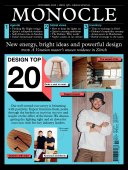
Issue 158
Looking to kit out your home, office or hotel for the colder months ahead? Look no further than our Design Top 20, with furniture finds, inspiring interiors and insights from key industry leaders. Plus: who will be keeping the lights on this winter, the rail industry gets back on track and a hotel special featuring openings from Manhattan to Hakone.
In This Issue
Oops! No content was found.
Looks like we no longer have content for the page you're on. Perhaps try a search?
Return Home

